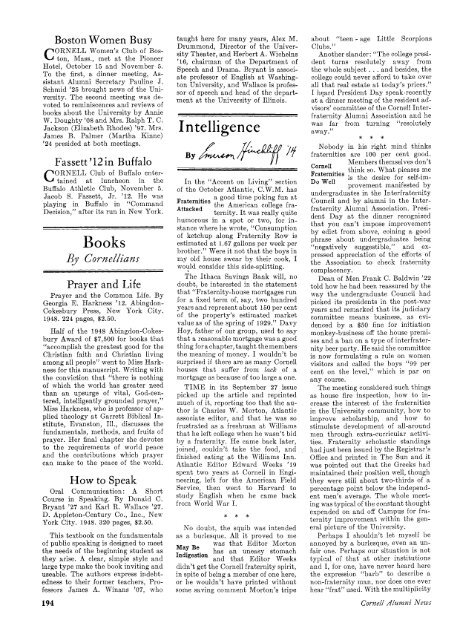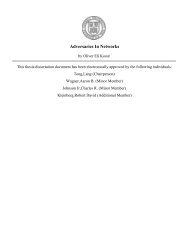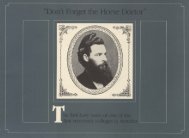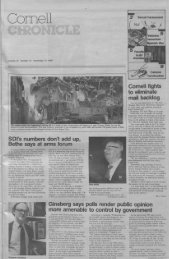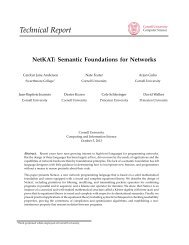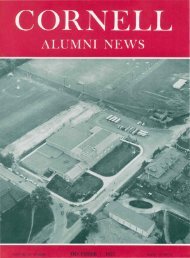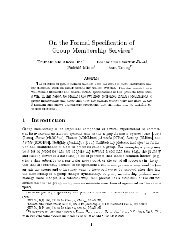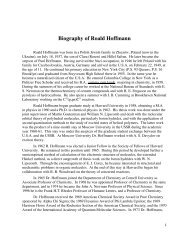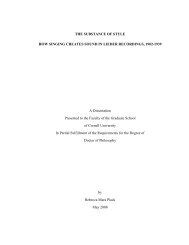Cornell Alumni News - eCommons@Cornell
Cornell Alumni News - eCommons@Cornell
Cornell Alumni News - eCommons@Cornell
You also want an ePaper? Increase the reach of your titles
YUMPU automatically turns print PDFs into web optimized ePapers that Google loves.
C<br />
Boston Women Busy<br />
ORNELL Women's Club of Boston,<br />
Mass., met at the Pioneer<br />
Hotel, October 15 and November 5.<br />
To the first, a dinner meeting, Assistant<br />
<strong>Alumni</strong> Secretary Pauline J.<br />
Schmid '25 brought news of the University.<br />
The second meeting was devoted<br />
to reminiscences and reviews of<br />
books about the University by Annie<br />
W. Doughty '08 and Mrs. Ralph T. C.<br />
Jackson (Elizabeth Rhodes) '97. Mrs.<br />
James B. Palmer (Martha Kinne)<br />
'24 presided at both meetings.<br />
Fassett'12in Buffalo<br />
/CORNELL Club of Buffalo enter-<br />
^ tained at luncheon in the<br />
Buffalo Athletic Club, November 5,<br />
Jacob S. Fassett, Jr. '12. He was<br />
playing in Buffalo in "Command<br />
Decision," after its run in New York.<br />
Books<br />
By <strong>Cornell</strong>ians<br />
Prayer and Life<br />
Prayer and the Common Life. By<br />
Georgia E. Harkness '12. Abingdon-<br />
Cokesbury Press, New York City.<br />
1948. 224 pages, $2.50.<br />
Half of the 1948 Abingdon-Cokesbury<br />
Award of $7,500 for books that<br />
"accomplish the greatest good for the<br />
Christian faith and Christian living<br />
among all people" went to Miss Harkness<br />
for this manuscript. Writing with<br />
the conviction that "there is nothing<br />
of which the world has greater need<br />
than an upsurge of vital, God-centered,<br />
intelligently grounded prayer,"<br />
Miss Harkness, who is professor of applied<br />
theology at Garrett Biblical Institute,<br />
Evanston, 111., discusses the<br />
fundamentals, methods, and fruits of<br />
prayer. Her final chapter she devotes<br />
to the requirements of world peace<br />
and the contributions which prayer<br />
can make to the peace of the world.<br />
How to Speak<br />
Oral Communication: A Short<br />
Course in Speaking. By Donald C.<br />
Bryant '27 and Karl R. Wallace '27.<br />
D. Appleton-Century Co., Inc., New<br />
York City. 1948. 320 pages, $2.50.<br />
This textbook on the fundamentals<br />
of public speaking is designed to meet<br />
the needs of the beginning student as<br />
they arise. A clear, simple style and<br />
large type make the book inviting and<br />
useable. The authors express indebtedness<br />
to their former teachers, Professors<br />
James A. λVinans '07, who<br />
194<br />
taught here for many years, Alex M.<br />
Drummond, Director of the University<br />
Theater, and Herbert A. Wichelns<br />
'16, chairman of the Department of<br />
Speech and Drama. Bryant is associate<br />
professor of English at Washington<br />
University, and Wallace is professor<br />
of speech and head of the department<br />
at the University of Illinois.<br />
Intelligence<br />
In the "Accent on Living" section<br />
of the October Atlantic, C.W.M. has<br />
_ , ... a good time poking fun at<br />
Fraternities ,, &<br />
. ^ ,, ,<br />
A ... , , the American college fra-<br />
Attacked , ., τ , „ .,<br />
termty. It was really quite<br />
humorous in a spot or two, for instance<br />
where he wrote, " Consumption<br />
of ketchup along Fraternity Row is<br />
estimated at 1.67 gallons per week per<br />
brother." Were it not that the boys in<br />
my old house swear by their cook, I<br />
would consider this side-splitting.<br />
The Ithaca Savings Bank will, no<br />
doubt, be interested in the statement<br />
that "Fraternity-house mortgages run<br />
for a fixed term of, say, two hundred<br />
years and represent about 150 per cent<br />
of the property's estimated market<br />
value as of the spring of 1929." Davy<br />
Hoy, father of our group, used to say<br />
that a reasonable mortgage was a good<br />
thing for a chapter, taught the members<br />
the meaning of money. I wouldn't be<br />
surprised if there are as many <strong>Cornell</strong><br />
houses that suffer from lack of a<br />
mortgage as because of too large a one.<br />
TIME in its September 27 issue<br />
picked up the article and reprinted<br />
much of it, reporting too that the author<br />
is Charles W. Morton, Atlantic<br />
associate editor, and that he was so<br />
frustrated as a freshman at Williams<br />
that he left college when he wasn't bid<br />
by a fraternity. He came back later,<br />
joined, couldn't take the food, and<br />
finished eating at the Williams Inn.<br />
Atlantic Editor Edward Weeks '19<br />
spent two years at <strong>Cornell</strong> in Engineering,<br />
left for the American Field<br />
Service, then went to Harvard to<br />
study English when he came back<br />
from World War I.<br />
No doubt, the squib was intended<br />
as a burlesque. All it proved to me<br />
,._ _ was that Editor Morton<br />
, , ,<br />
has an uneasy stomach<br />
May Be<br />
τ -: ..<br />
Indigestion<br />
didn't get the <strong>Cornell</strong> fraternity spirit,<br />
in spite of being a member of one here,<br />
or he wouldn't have printed without<br />
some saving comment Morton's tripe<br />
about "teen - age Little Scorpions<br />
Clubs."<br />
Another slander: "The college president<br />
turns resolutely away from<br />
the whole subject . . . and besides, the<br />
college could never afford to take over<br />
all that real estate at today's prices."<br />
I heard President Day speak-recently<br />
at a dinner meeting of the resident advisors'<br />
committee of the <strong>Cornell</strong> Interfraternity<br />
<strong>Alumni</strong> Association and he<br />
was far from turning "resolutely<br />
away."<br />
* * *<br />
Nobody in his right mind thinks<br />
fraternities are 100 per cent good.<br />
Members themselves don't<br />
° Γ ? 6 . A . think so. What pleases me<br />
D?Well<br />
is thβ desirβ f ° r Self " im provement manifested<br />
-<br />
by<br />
undergraduates in the Interfraternity<br />
Council and by alumni in the Interfraternity<br />
<strong>Alumni</strong> Association. President<br />
Day at the dinner recognized<br />
that you can't impose improvement<br />
by edict from above, coining a good<br />
phrase about undergraduates being<br />
"negatively suggestible," and expressed<br />
appreciation of the efforts of<br />
the Association to check fraternity<br />
complacency.<br />
Dean of Men Frank C. Baldwin '22<br />
told how he had been reassured by the<br />
way the undergraduate Council had<br />
picked its presidents in the post-war<br />
years and remarked that its judiciary<br />
committee means business, as evidenced<br />
by a $50 fine for initiation<br />
monkey-business off the house premises<br />
and a ban on a type of interfraternity<br />
beer party. He said the committee<br />
is now formulating a rule on women<br />
visitors and called the boys "99 per<br />
cent on the level," which is par on<br />
any course.<br />
The meeting considered such things<br />
as house fire inspection, how to increase<br />
the interest of the fraternities<br />
in the University community, how to<br />
improve scholarship, and how to<br />
stimulate development of all-around<br />
men through extra-curricular activities.<br />
Fraternity scholastic standings<br />
had just been issued by the Registrar's<br />
Office and printed in The Sun and it<br />
was pointed out that the Greeks had<br />
maintained their position well, though<br />
they were still about two-thirds of a<br />
percentage point below the independent<br />
men's average. The whole meeting<br />
was typical of the constant thought<br />
expended on and off Campus for fraternity<br />
improvement within the general<br />
picture of the University.<br />
Perhaps I shouldn't let myself be<br />
annoyed by a burlesque, even an unfair<br />
one. Perhaps our situation is not<br />
typical of that at other institutions<br />
and I, for one, have never heard here<br />
the expression "barb" to describe a<br />
non-fraternity man, nor does one ever<br />
hear "frat" used. With the multiplicity<br />
<strong>Cornell</strong> <strong>Alumni</strong> <strong>News</strong>


